
Posted by Webby on
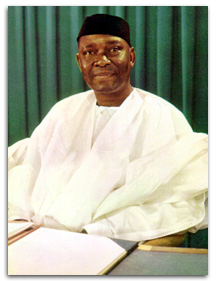
"ZIK OF AFRICA"
THE EARLY YEARS
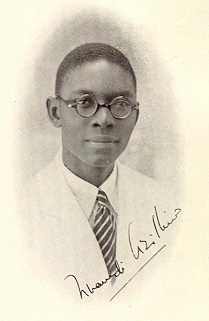
"Zik was one of the most practical, most pragmatic people that I knew during my political life. Whenever he was in London, I was always very, very happy to welcome him to my residence at 8 Aylestone Avenue, Brontesbury Park, for our group discussions about our individual and collective fight for independence and self rule. Zik would listen quietly as so-and-so said this-and-that and as arguments and discussions would stray from reality. When Zik finally spoke in his careful, measured and logical way, it would refocus our discussions to the more practical and achievable objectives.
I had great admiration for his intellect, his logic and most of all, his intense love for his Motherland, Nigeria."
Ngwazi Dr. H. Kamuzu Banda
Founding President of Malawi
In his own words, discussions with the author
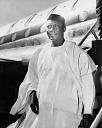 |
 |
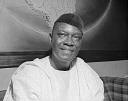 |
| Nnamdi
Azikiwe, Premier of East Nigeria, shown upon arrival at Idlewild Airport
from London 7/5/59. |
||
There is a profound feeling of humility and inadequacy that comes over me whenever I begin to write about one of the great indigenous men and women of Africa. No matter how well I think I may have known them, personally or through the written word, I am very aware of their complexity as people with feet in two worlds, the contemporary and the traditional. As a non-African friend of Africa, I realized years ago that I have been and am privileged to have been allowed only rather superficial glimpses of their complexity and the elements that made them great. No where is that more apparent to me than attempting to write about the incredible life of the late Dr. Nnamdi Azikiwe, the great "Zik of Africa", first President of the Federal Republic of Nigeria.
Benjamin Nnamdi Azikiwe was born on 16 November 1904 in Zunguru, Northern Nigeria, to Onitsha Ibo parents. At a very early age, he was exposed to the inequities of colonialism (a realization that was to cause him to eventually drop his anglicized first name), when his father, Obed-Edom Chukwaemeka Azikiwe, a civilian clerk for a British army regiment, was forced to leave his job because of discrimination. The memory of this sorrowful event was to have a continuing major influence on his political attitudes and actions in the years to come.
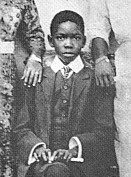 Like
most of the African greats, young Nnamdi had an insatiable quest for knowledge,
and the rural life of turn-of-the-century Zungura provided only the barest minimum
of educational opportunity. In his early years, he spoke only the Hausa language
of the north but at the age of eight, he was sent to Onitsha to live with his
paternal grandparents where, under their determined tutelage, he became fluent
in the Ibo and Yoruba languages and eventually, English. His earliest formal
schooling began at the Roman Catholic and Church Missionary Society’s Anglican
missions at Onitsha where he excelled both in academics and sports. Outgrowing
Onitsha’s academic capabilities, Nnamdi moved on to the Wesleyan Boys High School
in Lagos and then again to the Hope Waddell Training Institute in Calabar, an
historic place to which he would return years later under much different circumstances.
Like
most of the African greats, young Nnamdi had an insatiable quest for knowledge,
and the rural life of turn-of-the-century Zungura provided only the barest minimum
of educational opportunity. In his early years, he spoke only the Hausa language
of the north but at the age of eight, he was sent to Onitsha to live with his
paternal grandparents where, under their determined tutelage, he became fluent
in the Ibo and Yoruba languages and eventually, English. His earliest formal
schooling began at the Roman Catholic and Church Missionary Society’s Anglican
missions at Onitsha where he excelled both in academics and sports. Outgrowing
Onitsha’s academic capabilities, Nnamdi moved on to the Wesleyan Boys High School
in Lagos and then again to the Hope Waddell Training Institute in Calabar, an
historic place to which he would return years later under much different circumstances.
Once again, in common with his fellow African greats, schooling was insufficient to fuel his towering intellect. He read voraciously. He devoured the philosophy of Marcus Garvey and the writings of W. E. B. DuBois. He followed very closely the career of The Great Aggrey of the Gold Coast (Great Epic Books Newsletter archive: May, June, July, 1998) . The "Black Zionism" of Garvey intrigued him. DuBois’ THE SOULS OF BLACK FOLK, Chicago, A. C. McClurg, 1904, shocked him and The Great Aggrey inspired him. He was to tell me many years later that the fortuitous finding and reading of an obscure 1903 DuBois publication, POSSIBILITIES OF THE NEGRO; THE ADVANCE GUARD OF RACE, was to be an everlasting and enormous influence on his business and political life.
Azikiwe was also carefully tutored in the great customs and traditions of his Ibo people and of the Nigerian nation. He quickly recognized the dichotomy of the two worlds in which he was part; that of the contemporary educated African and of the future custodian of venerable and vital tribal traditions and national culture. He vowed never to sacrifice one for the other and he remained ever-faithful to that vow.
 Brief
unfulfilling civil service employment followed secondary school. Determined
to continue his education, Azikiwe traveled the well-worn path to the United
States. In 1925, at age 21, he enrolled at Storer College at infamous Harpers
Ferry, West Virginia, where he quickly acquired the nickname "Zik", by which
he was to be known for the rest of his life. He spent one year at Storer, also
enrolling in an intensive correspondence course in American Law and Procedures
through LaSalle Law School of Chicago. He excelled in both.
Brief
unfulfilling civil service employment followed secondary school. Determined
to continue his education, Azikiwe traveled the well-worn path to the United
States. In 1925, at age 21, he enrolled at Storer College at infamous Harpers
Ferry, West Virginia, where he quickly acquired the nickname "Zik", by which
he was to be known for the rest of his life. He spent one year at Storer, also
enrolling in an intensive correspondence course in American Law and Procedures
through LaSalle Law School of Chicago. He excelled in both.
America of the 1920’s, while offering Zik obvious opportunities, was oftentimes
disillusioning, and indeed hostile, to the young Nigerian. Poverty stricken,
depressed and homesick for Africa, and deeply affected by racial taunts, he
went from job to job under the name of "Ben Zik", trying to earn enough to continue
with his education. In 1926, he matriculated to Howard University in Washington,
D.C. where a hoped for job fell through causing even greater financial strain.
Finally, in early 1927, an offer of a steady on-campus job at Lincoln University
enabled him to complete his undergraduate degree in Political Science. On to
Columbia University and a part-time teaching assistantship, allowing him to
obtain a certificate in journalism while editing the  COLUMBIA
UNIVERSITY SUMMER SESSIONS TIMES (1930), his first foray into the publishing
world. In 1930, Zik was back at Lincoln University where he was awarded an M.A.
in Political Science with honors and wrote and published his first book, LIBERIA
IN WORLD POLITICS, self, 1931. Finally, in 1932, he traveled on to the University
of Pennsylvania on a scholarship where he earned an M. Sc. With honors in Anthropology,
coming to the attention of the great Professor Bronislaw Malinowski of London
University.
COLUMBIA
UNIVERSITY SUMMER SESSIONS TIMES (1930), his first foray into the publishing
world. In 1930, Zik was back at Lincoln University where he was awarded an M.A.
in Political Science with honors and wrote and published his first book, LIBERIA
IN WORLD POLITICS, self, 1931. Finally, in 1932, he traveled on to the University
of Pennsylvania on a scholarship where he earned an M. Sc. With honors in Anthropology,
coming to the attention of the great Professor Bronislaw Malinowski of London
University.
After graduation in the late spring of 1934, Zik journeyed back to Africa, passing up Malinowski’s offer of Doctoral pursuits at London University in favor of beginning his efforts on behalf of Africa. While in transit in the Gold Coast, Zik met the already well known trade unionist and newspaperman, I. T. Wallace-Johnson of Sierra Leone. Wallace-Johnson offered Zik his first professional employment as editor of the AFRICAN MORNING POST, an Accra newspaper which he accepted and worked diligently at for three years, narrowly escaping prison after being arrested for publishing a "treasonous" article, a charge that was fortunately overturned on appeal.
In February, 1937, Zik finally returned to Nigeria filled with a passion to somehow be of great influence in the future of his homeland. He was very well educated. He had read broadly, absorbing the spectrum of politic philosophies, embracing everything from the days of ancient Greece to the current state of world political dogma. He had succeeded as a journalist, tasting Britain’s wrath when their colonial system was challenged. He was keen to pursue business and commercial interests. Physically, he was an imposing figure in any crowd. Zik was more than six feet tall, broad shouldered and of very pleasant countenance. He possessed a courtly, almost "old world" charm. When he spoke, it was in a clear, mellifluous voice that at once pronounced the speaker’s humility and authority. His voice and delivery were described as "seductive, eloquent, persuasive and spell-binding".
Zik, though still considered young at 33, living in a land where wisdom is equated with age, was clearly a very gifted man, destined to figure prominently in colonial Nigeria’s future. He knew it. His fellow Nigerians knew it and, watching uneasily, the British colonists and authorities also knew it. Just what his role and impact was is the subject for December’s Great Epic’s Newsletter "Zik of Africa, The Business and Political Years".